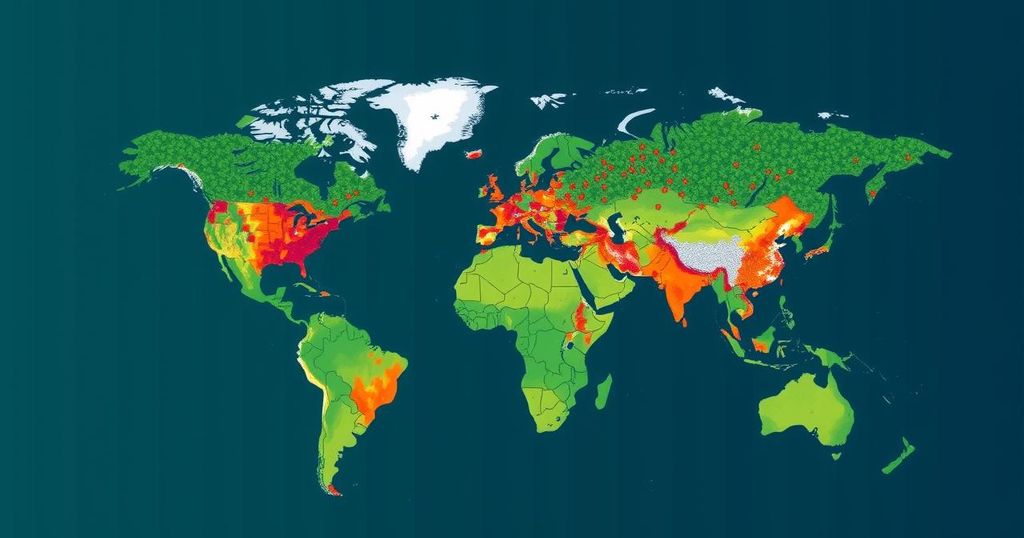The onset of 2024 has accentuated a noteworthy decline in global political commitment to address the climate crisis, amidst a backdrop of heightened electoral activity. As leaders who dismiss climate urgency gain traction, concerns escalate regarding the prioritization of climate issues relative to inflation and energy risks. This regressive trend has culminated in diminishing attention to climate action leading into critical international gatherings such as Cop29.
The year 2024 has emerged as a pivotal electoral season globally, yet it has simultaneously highlighted a worrying trend: the commitment to tackle the escalating climate crisis is faltering in numerous countries. Despite unprecedented climatic extremes and disasters, political discourse has shifted away from prioritizing climate action, as evidenced by the ascendance of climate-skeptical leaders such as U.S. President-elect Donald Trump and traditional right-wing parties in Europe. Indeed, it appears that interests related to inflation and energy prices are taking precedence over environmental considerations.
Catherine Fieschi, an expert in European politics and populism, remarks on the evident decline in climate prioritization, asserting that this trend is paradoxical in light of growing environmental crises. She notes, “It’s been a bad year for climate, and we’ve seen a gradual erosion in the public’s commitment to action for a couple of years now.” The attention climate issues once commanded—marked by influential activist movements like those led by Greta Thunberg—has dwindled significantly in the wake of pressing global issues, including the pandemic and geopolitical conflicts.
While extreme weather events continue to wreak havoc across continents, the climate crisis has become a secondary concern in political arenas except in specific instances like India. Voter sentiment has drifted towards candidates who either overtly disregard environmental regulations or downplay the importance of climate action, as seen in various elections worldwide. However, not all nations are uniformly retreating from climate discussions; places such as the United Kingdom have witnessed political shifts that reaffirm a commitment to clean energy.
Yet, the overarching sentiment reflects a concerning stagnation in global momentum towards combating climate change. Jan-Werner Müller, a political scientist, underscores the precarious balance politicians seek to maintain, acknowledging that many center-right actors are making concessions on climate issues to align with populist sentiments. “They are making pre-emptive concessions to populism and are reading climate as part of the culture war,” he observes.
The recently concluded Cop29 climate summit in Azerbaijan compounds these concerns, as attendance was noticeably low among world leaders. The summit has faced scrutiny, particularly as high-profile nations continue to exhibit a lack of genuine commitment to addressing climate challenges. Activist Gerry Arances pointedly critiques this, stating, “We wonder how governments of historically polluting nations still dare show their faces with claims of climate leadership and commitment.”
In summary, the current electoral landscape illustrates a disheartening regression in the global pledge to address the climate crisis. It raises pressing questions about political will and the urgency required to confront environmental challenges effectively, leaving scientists and activists anxious about the future of the planet as critical opportunities for action continue to slip away.
The urgency of the climate crisis has been increasingly acknowledged worldwide, yet recent global electoral trends reveal a troubling decline in political commitment to address environmental issues. Major electoral events in 2024, dubbed by the United Nations as the “biggest election year in human history,” have seen the rise of leaders who often view climate action unfavorably, despite clear evidence pointing to the rapid deterioration of global climate conditions. This background highlights the complex interplay between voter priorities, emerging political landscapes, and the pressing need for decisive climate action amidst ongoing global challenges.
The disconcerting trend observed in the 2024 electoral landscape reflects a waning commitment to the climate crisis, as political discourse increasingly sidelines environmental concerns. While some areas exhibit a resilience towards clean energy initiatives, overall, the momentum towards decisive climate action appears to be faltering. With the backdrop of successive extreme climatic events, the challenge remains for political leaders to effectively realign public interests towards sustainable practices, raising alarm among scientists and activists about the planet’s future.
Original Source: www.theguardian.com






